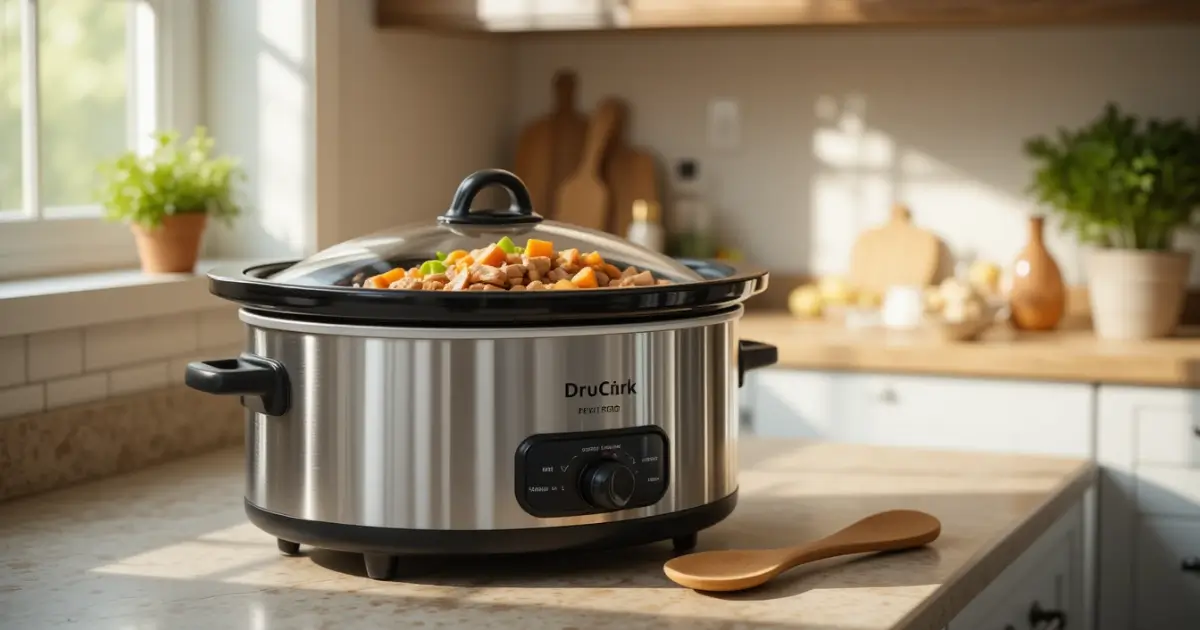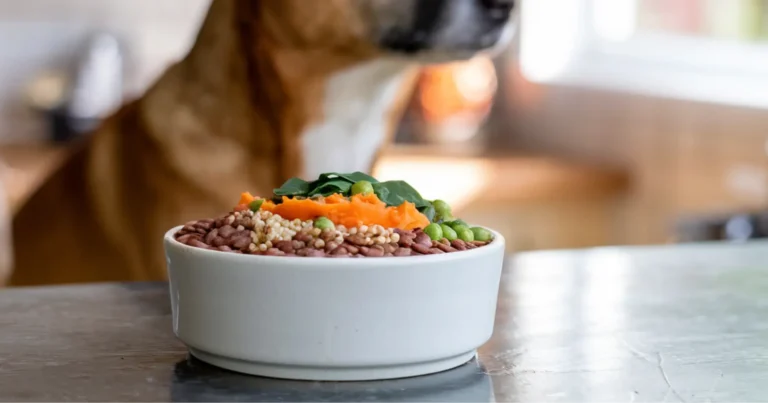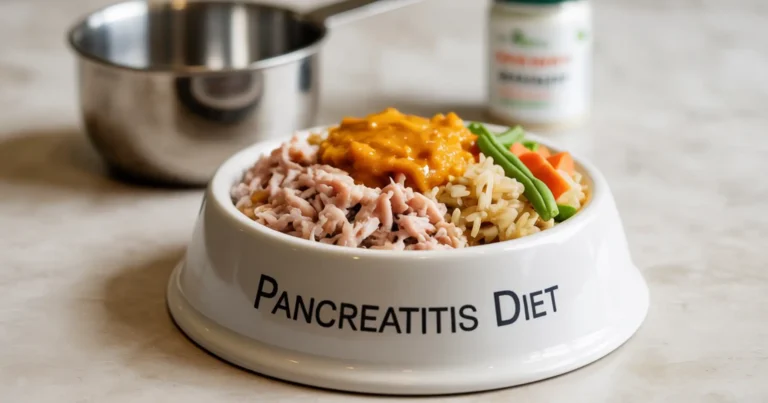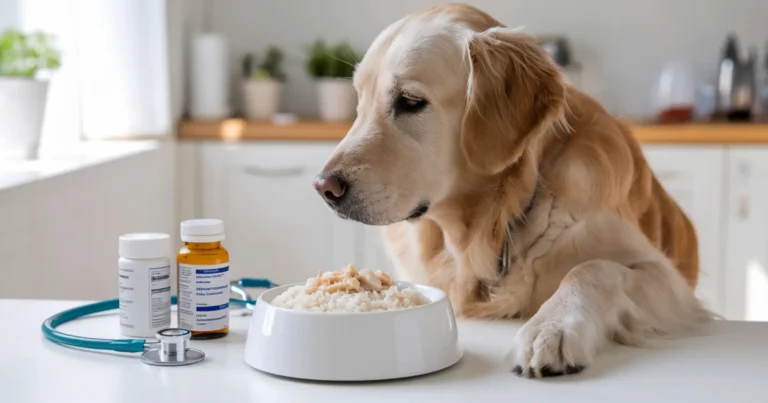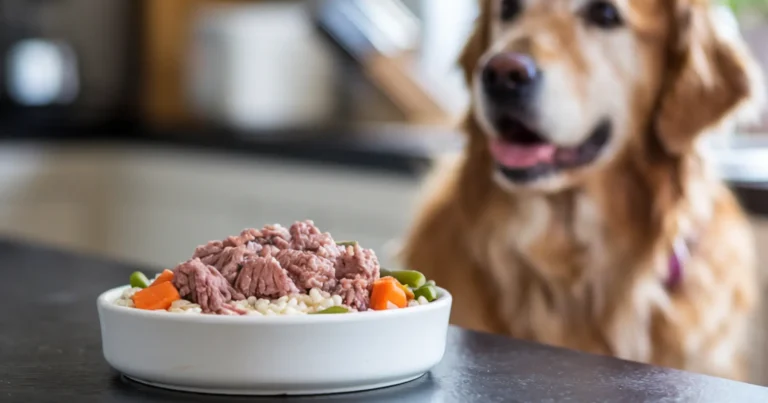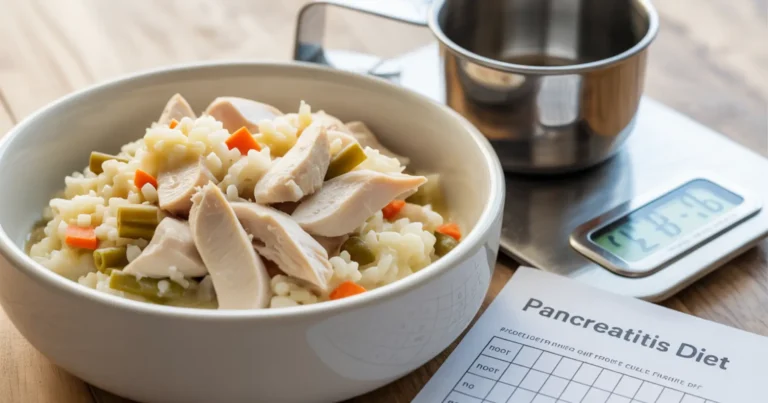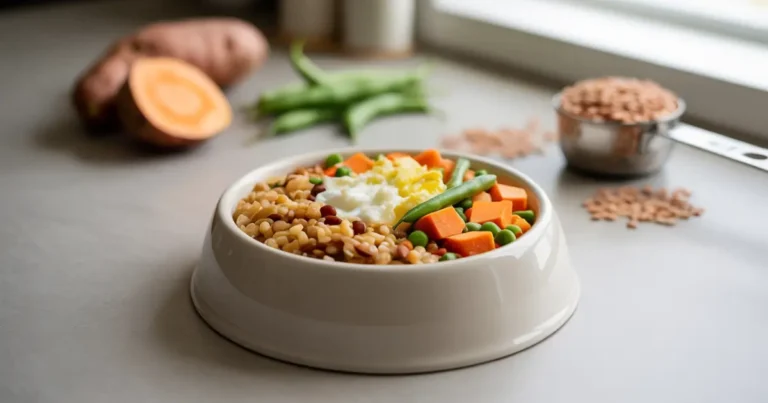Crockpot Dog Food for Allergies – 3 Easy Solutions
Is your furry friend constantly scratching, licking their paws, or suffering from digestive issues? Food allergies might be the culprit, and preparing crockpot dog food at home could be the solution you’ve been searching for. Homemade slow cooker recipes give you complete control over ingredients, making it easier to eliminate common allergens while providing nutritious meals your dog will love.
Table of Contents
What Causes Food Allergies in Dogs?
Food allergies in dogs typically develop when their immune system misidentifies certain food proteins as harmful. Unlike humans, who often react to peanuts or shellfish, dogs commonly develop allergies to proteins they’ve been repeatedly exposed to in commercial dog foods.
Common Food Allergens for Dogs
The most frequent food allergens in dogs include:
- Beef
- Chicken
- Dairy
- Wheat
- Soy
- Corn
- Egg
Many commercial dog foods contain multiple potential allergens, making it difficult to identify the specific trigger. This is where homemade crockpot dog food becomes invaluable – you control exactly what goes into your dog’s bowl.
Benefits of Making Crockpot Dog Food for Allergic Dogs
Creating homemade dog food in your slow cooker offers several advantages for dogs with food sensitivities:
- Complete ingredient control: You select every component, eliminating known allergens
- Fewer preservatives and additives: Many commercial foods contain ingredients that can trigger reactions
- Higher quality protein sources: You can choose novel proteins your dog hasn’t been exposed to
- Cost-effective: Preparing food in bulk saves money compared to prescription allergy diets
- Mental peace: Knowing exactly what your dog is eating
Your dog can enjoy nutritious meals tailored specifically to their needs, potentially eliminating uncomfortable allergy symptoms while providing wholesome nutrition.
Essential Nutrients for Homemade Dog Food
Before diving into crockpot dog food recipes, it’s crucial to understand what nutrients your dog needs. Dogs require a balanced diet containing:
Proteins
Proteins form the foundation of your dog’s diet. For allergic dogs, novel protein sources they haven’t previously eaten may be less likely to trigger reactions. Good options include:
- Turkey
- Duck
- Venison
- Rabbit
- Fish (such as salmon)
Carbohydrates
While dogs don’t have specific carbohydrate requirements, these ingredients provide energy and important nutrients. Allergy-friendly options include:
- Sweet potatoes
- Brown rice
- Oats
- Quinoa
- Pumpkin
Vegetables
Vegetables provide essential vitamins, minerals, and fiber. Safe options for most dogs include:
- Carrots
- Green beans
- Spinach
- Zucchini
- Broccoli (in moderation)
Healthy Fats
Fats are crucial for skin health, which is particularly important for allergic dogs. Beneficial sources include:
- Olive oil
- Coconut oil
- Fish oil (omega-3 fatty acids)
Vet-Approved Crockpot Dog Food Recipe for Allergies
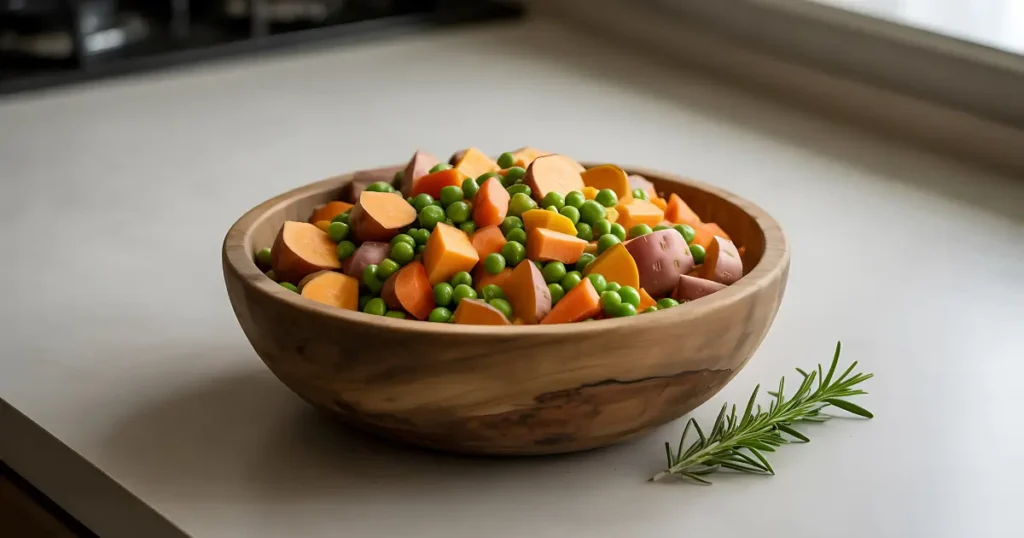
This recipe uses limited, allergy-friendly ingredients while providing complete nutrition. Always consult your veterinarian before making major changes to your dog’s diet, especially if they have existing health conditions.
Turkey & Sweet Potato Crockpot Dog Food
Ingredients:
- 3 pounds ground turkey (a novel protein for many dogs)
- 2 medium sweet potatoes, cubed
- 2 cups carrots, chopped
- 1 cup green beans, chopped
- 1 cup brown rice
- 6 cups of water
- 2 tablespoons olive oil
- 1 teaspoon dried parsley (optional, for added nutrients)
Instructions:
- Prepare ingredients: Wash and chop all vegetables into dog-appropriate sizes.
- Layer in crockpot: Add ground turkey, sweet potatoes, carrots, and green beans to your slow cooker.
- Add water and rice: Pour the brown rice and water.
- Cook: Set your crockpot to low and cook for 5-6 hours until the rice is tender and the meat is thoroughly cooked.
- Add fats: When cooking is complete, stir in olive oil.
- Cool and serve: Before giving your dog the mixture, allow it to cool fully.
- Portion and store: Divide into appropriate serving sizes and refrigerate for up to 3-4 days or freeze for up to 3 months.
This recipe yields approximately 10-12 cups of food, depending on your crockpot size. The weight, age, and activity level of your dog will all affect the serving size.
How to Introduce New Homemade Dog Food
When transitioning your allergic dog to homemade crockpot food, do so gradually to avoid digestive upset:
- Day 1-2: Mix 25% new food with 75% old food
- Day 3-4: Mix 50% new food with 50% old food
- Day 5-6: Mix 25% old food with 75% new food
- Day 7+: Feed 100% new food if your dog has transitioned well
Monitor your dog closely during the transition period. Signs that the new diet is helping should include reduced scratching, improved coat condition, and better digestion. If symptoms worsen, consult your veterinarian immediately.
Customizing Crockpot Dog Food for Specific Allergies
Preparing homemade meals tailored for dogs with allergies allows you to adapt recipes based on your pet’s specific sensitivities. Here are some substitution ideas:
Protein Alternatives
If your dog is allergic to turkey, consider:
- Ground duck
- Ground rabbit
- Venison
- White fish (like cod or tilapia)
Carbohydrate Alternatives
If sweet potatoes or rice trigger reactions, try:
- Quinoa (high in protein and generally well-tolerated)
- Millet
- Tapioca
- Peeled white potatoes
Adding Supplements
Most homemade dog foods benefit from additional supplements to ensure complete nutrition:
- Calcium (from eggshell powder or a veterinary supplement)
- Multivitamin formulated for dogs
- Omega-3 fatty acids (especially beneficial for skin and coat health)
Always introduce one new ingredient at a time so you can identify any triggers if your dog reacts negatively.
Storage and Serving Tips for Homemade Dog Food
Properly storing your crockpot dog food helps maintain its nutritional value and prevents spoilage:
- Refrigeration: Store portions for up to 3-4 days in airtight containers
- Freezing: Freeze individual portions in silicone molds or freezer-safe containers for up to 3 months
- Thawing: Thaw frozen portions in the refrigerator overnight, never at room temperature
- Reheating: Gently warm refrigerated food to room temperature before serving, never serve cold food directly from the refrigerator
For convenience, prepare large batches monthly and freeze individual portions for easy meal prep.
Signs Your Dog’s Food Allergies Are Improving
When you’ve found the right crockpot dog food recipe for your allergic pup, you should notice positive changes within 4-8 weeks:
- Reduced scratching and paw licking
- Improved coat shine and less dander
- Fewer ear infections
- Better digestion with reduced gas and firmer stools
- Increased energy and improved mood
If you don’t see improvement after 8 weeks of a consistent diet, consult your veterinarian about further allergy testing or diet modifications.
Common Mistakes to Avoid When Making Dog Food
Creating homemade crockpot dog food requires attention to detail. Avoid these common pitfalls:
- Unbalanced nutrition: Dogs need specific nutrient ratios; don’t simply feed meat and rice
- Including toxic ingredients: Onions, garlic, grapes, raisins, chocolate, and xylitol are toxic to dogs
- Inconsistent ingredients: Changing ingredients frequently can make it difficult to identify allergens
- Insufficient cooking: Ensure all meats reach safe temperatures to kill harmful bacteria
- Skipping veterinary consultation: Always work with your vet when addressing food allergies
When to Consult Your Veterinarian
While homemade crockpot dog food can help manage allergies, certain situations require professional veterinary guidance:
- If symptoms persist or worsen despite dietary changes
- Before starting any elimination diet
- If your dog experiences weight loss, lethargy, or vomiting
- Before adding supplements to homemade food
- If your dog has multiple health conditions beyond allergies
Your veterinarian may recommend food sensitivity testing or prescription diets for severe cases.
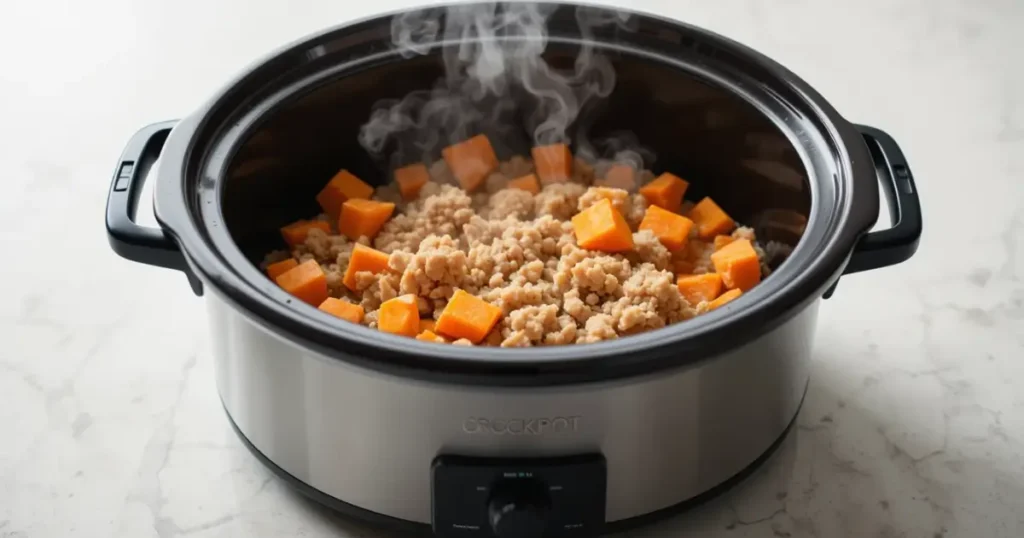
Conclusion
Creating crockpot dog food for allergic pets empowers you to take control of your dog’s nutrition while potentially relieving uncomfortable allergy symptoms. By carefully selecting ingredients and following balanced recipes, you can provide delicious homemade meals that support your dog’s overall health and well-being. Remember to transition slowly, monitor your pet’s response, and work with your veterinarian to ensure nutritional completeness. With patience and persistence, many dogs with food allergies can find relief through thoughtfully prepared homemade diets.
Key Takeaways
- Homemade crockpot dog food gives you complete control over ingredients, helping eliminate allergens from your dog’s diet
- Dairy, wheat, soy, maize, beef, and chicken are among the common ingredients that cause allergies in dog food.
- Novel proteins like turkey, duck, or rabbit may be better tolerated by dogs with allergies
- Always introduce new foods gradually over a period of seven to ten days.
- Before making big dietary changes, speak with your veterinarian.
- Properly balanced homemade recipes should include protein, carbohydrates, vegetables, and healthy fats
- Store homemade dog food properly to maintain freshness and nutritional value
FAQs About Crockpot Dog Food for Allergies
How do I know if my dog has food allergies versus environmental allergies?
Food allergies typically cause year-round symptoms, often involving gastrointestinal issues like diarrhea or vomiting alongside skin problems. Environmental allergies tend to be seasonal and primarily affect the skin, eyes, and respiratory system. A veterinarian can help determine the type of allergy through elimination diets or allergy testing.
Can I make a large batch of crockpot dog food and freeze it?
Yes! Preparing large batches of homemade dog food and freezing individual portions is efficient and convenient. The majority of homemade dog food recipes may be safely stored for up to three months. Thaw portions in the refrigerator overnight before serving.
Does homemade dog food require the addition of supplements?
Most homemade dog food benefits from appropriate supplementation to ensure complete nutrition. Calcium is particularly important, as homemade diets often lack sufficient amounts. Consult your veterinarian about which supplements your dog needs based on their specific recipe and health status.
How long does it take to see improvement in allergy symptoms?
With the right diet, you may notice improvements within 4-8 weeks. Skin-related symptoms often take longer to resolve than digestive issues. To monitor your dog’s progress over time, keep a log of their symptoms.
Can puppies eat homemade crockpot dog food for allergies?
Puppies need carefully balanced meals for healthy growth and development since their dietary requirements differ from those of adult dogs. While puppies can eat homemade food, recipes must be specially formulated for their growth requirements. Always consult with a veterinary nutritionist before feeding homemade food to puppies with suspected allergies.

